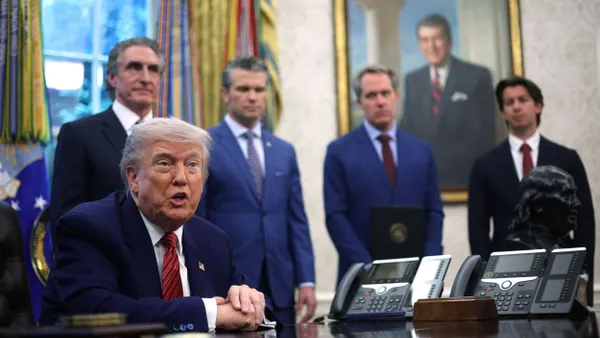Dive Brief:
- The attorneys general of seven states and the District of Columbia wrote to EPA Administrator Scott Pruitt Monday asking him to withdraw a proposed rule that would overhaul the scientific review processes that underpin the agency's regulations.
- The coalition, led by former New York Attorney General Eric Schneiderman (D), said the EPA should convene with the National Academy of Sciences to determine if changes to the review process are needed. If Pruitt refuses to withdraw, the coalition requested the comment period on the rule be extended by five months.
- The EPA rule, proposed April 30, would only allow the agency to consider scientific studies in its rulemaking processes that disclose all of their methods and data — a move critics say will exclude a broad swath of public health studies.
Dive Insight:
EPA bases pollution regulations on expected impacts on human health, so changes to its scientific review process have the potential to impact nearly every action it takes in the power sector.
In a hearing last month, Pruitt said the proposed rule aims to enhance transparency in the agency's rulemaking processes.
"Seems to me that it's common sense that when we make a rule at [the] agency, [we] base it on a record in which you can see the data," Pruitt told lawmakers.
Critics, however, say the rule would exclude human health studies that form the foundations of many important EPA rules, and would also give the administrator the final say over which studies are considered.
"The type of studies you want to exclude are the same kind of scientific studies that lead in pipe and paints harm children and that secondhand smoke is a dangerous carcinogen," Rep. Raul Ruiz (D-CA) said at the hearing. "We're talking about landmark studies such as the Harvard School of Public Health's Six Cities Study that proved a connection between air pollution and early death back in 1993."
Individual health information in such studies must be kept confidential to meet medical ethics requirements, and requiring all data to be made public could prevent the consideration of some studies, particularly ones with small sample sizes focused on the localized impact of pollutants. Some of those studies later became the "foundation of fine particulate matter pollution regulations under the Clean Air Act," Ruiz noted.
In their letter, the attorneys general wrote that Pruitt's proposed rule is too vague and far-reaching to consider with a normal 30-day comment period. If the administrator refuses to withdraw the rule, they wrote, the agency should at least allow for 150 more days on top of the original period for stakeholders to consider its implications.
"A full six-month comment period would be consistent with past practice for matters of similar importance and complexity, and is necessary to provide the public and other stakeholders a meaningful opportunity to evaluate the proposal and its implications for the agency’s ability to meet its obligation to protect public health and the environment under federal environmental laws," they wrote.
In the hours after the letter was sent to Pruitt, Schneiderman resigned his post as New York attorney general after multiple women accused him of physical abuse. It remains unclear how the revelations will affect the multiple lawsuits his office had launched against the EPA.













